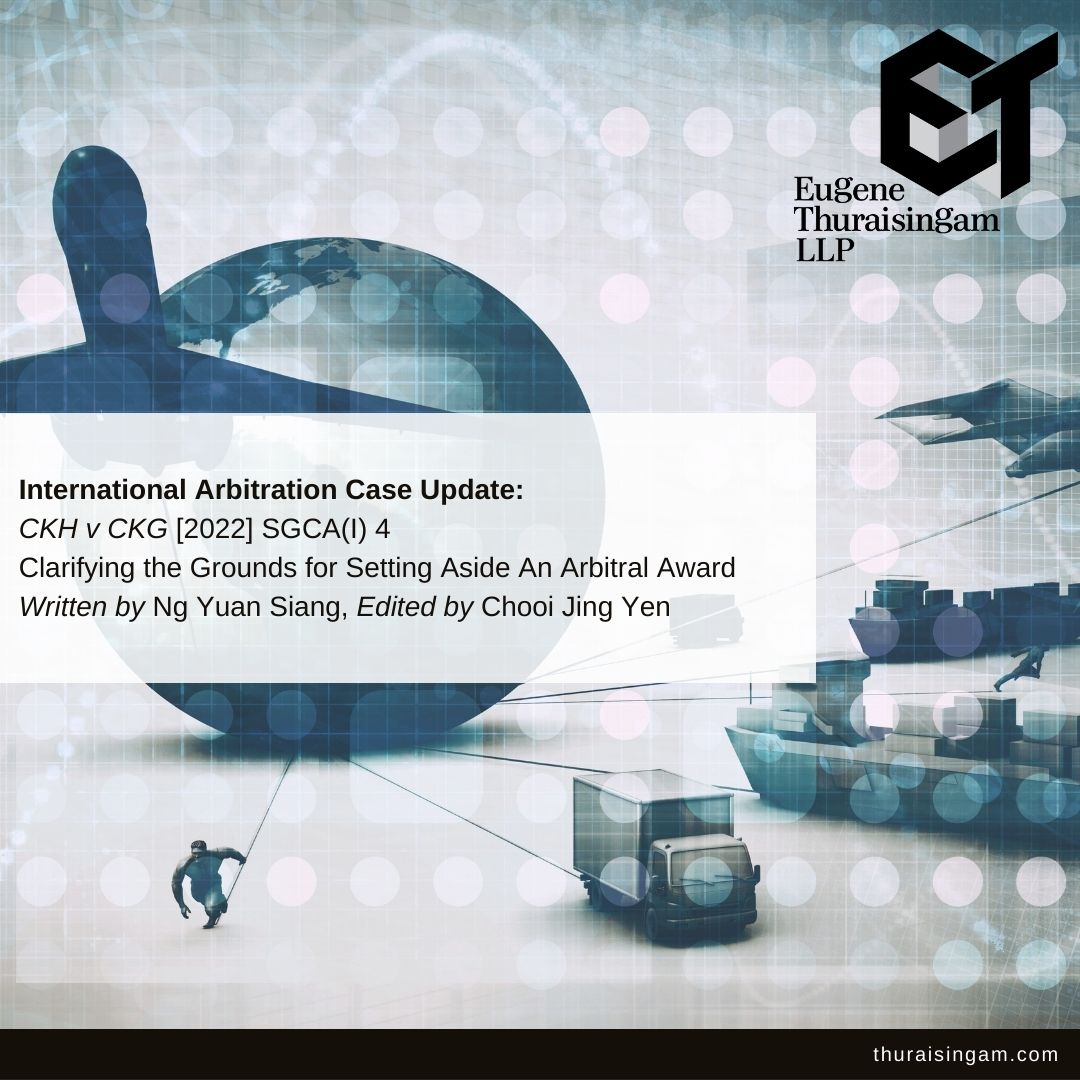Clarifying the grounds for setting aside an arbitral award
CKH v CKG [2022] SGCA(I) 4
In recent years, the number of applications to set aside arbitral awards under the International Arbitration Act 1994 (the “IAA”) have somewhat increased. CKH v CKG [2022] SGCA(I) 4 (“CKH (CA)”) is one of the rarer occasions where a setting aside application has been successful, at least in part. It presents a good opportunity to look at how breaches of natural justice may occur in an arbitration.
The grounds for setting aside an arbitral award under the International Arbitration Act 1994 (the “IAA”) are exhaustively defined in s 24 of the IAA1 and Art 34(2) and (3) of the UNCITRAL Model Law on International Commercial Arbitration 1985 (the “Model Law2”). The Model Law is given force of law in Singapore by virtue of s 3 of the IAA.3
1. Facts
CKH (CA) was an appeal against the decision of the Singapore International Commercial Court (“SICC”) in CKG v CKH [2021] SGHC(I) 5, concerning s 24(b) of the IAA and Art 34(2)(a)(iii) of the Model Law. The former subsection provides that the General Division of the High Court may set aside an arbitral award if there was, in the making of the award, a breach of the rules of natural justice by which the rights of any party are prejudiced.4 The latter Article provides, inter alia, that a court can set aside an arbitral award upon proof that “the award deals with a dispute not contemplated by or not falling within the terms of the submission to arbitration, or contains decisions on matters beyond the scope of the submission to arbitration”.5
The facts of the present case are complicated. What is relevant is summarised here. The parties entered into an agreement where CKH would sell its timber concession interests to CKG. In exchange, CKG would pay US$8 million and provide a three-year supply of round logs for CKH’s plywood factory. It was provided, inter alia, that CKG would supply these round logs on a free-on-board basis, while CKH would bear all local, national or other taxes. In a separate document accepted as part of the agreement between the parties and which concerned separate obligations, a clause provided for a contractual set-off mechanism by which CKG could reduce its round log volume obligations based on the amount of outstanding debt owed to them by CKH (the “debt-to-log conversion”). This clause also provided that both parties “will attempt to settle all or any outstanding matters in an amicable manner”.6
1.1. The arbitral tribunal’s (the “Tribunal”) decisions
Both parties breached their agreement. There was a shortfall in CKG’s supply of logs and CKH failed to make the agreed payments. CKH initiated the original application. It was not disputed that CKH owed CKG a debt of about IDR 50 billion in relation to freight and taxes for logs CKG already supplied (the “Principal Debt”). However, the Tribunal found that CKG could not rely on the debt-to-log conversion to reduce its round log volume obligations, because CKG had not attempted to settle the dispute amicably. The Tribunal therefore decided that CKG was liable to CKH in damages amounting to US$8,512,789.88 and 15,126,969,785 Indonesian rupiah (“IDR”) while CKH was liable in damages to CKG in the lesser sum of IDR29,918,809,545.86.7
CKG later applied to the Tribunal for an additional award to address the Principal Debt. The Tribunal denied this request on the basis that, inter alia, it had no jurisdiction since CKG made no “claim” for it in the arbitration.8
1.2. The SICC’s partial setting aside of arbitral award
CKG thereafter applied to the SICC to set aside the arbitral award on the basis that it had failed to consider, inter alia, the issue pertaining to the Principal Debt. It relied on the aforementioned s 24(b) of the IAA and Art 34(2)(a)(iii) of the Model Law.9
The SICC found that the Tribunal’s failure to consider the Principal Debt amounted to a breach of natural justice, because it was a significant issue which could affect the sums owing between the parties and the costs of the Arbitration. Even if CKG was not entitled to use the debt-to-log conversion to set off its round log volume obligations, the Principal Debt and interest was still owed by CKH to CKG and should still have been taken into account in awarding damages. The relevant paragraphs of the Award were therefore set aside under Art 34(2)(a)(iii) of the Model Law read with s 24(b) of the IAA, though the setting aside was suspended for a period of time pursuant to Art 34(4) of the Model Law10to allow the Tribunal sufficient time to determine the issue pertaining to the Principal Debt.11
The SICC further ordered that if the Tribunal were still unable to eliminate the grounds for setting aside, the relevant paragraphs of the arbitral award would be set aside in its entirety.12
2. The Court of Appeal’s decision on the setting-aside application
This takes us to CKH (CA), CKH’s appeal against the SICC’s decision to partially set aside the arbitral award. The only issue before the Court of Appeal was whether the Tribunal should have taken into account the existence and amount of the Principal Debt and interest on it.13
Before discussing the SICC’s decision to partially set aside the arbitral award, the Court of Appeal first considered the law on setting-aside an arbitral award. It found that the failure by an arbitral tribunal to address an issue submitted to it for adjudication may constitute a breach of the rules of natural justice within the meaning of s 24(b) of the IAA. While Art 34(2)(a)(iii) of the Model Law only provides that a court may set aside an award if it deals with a dispute not contemplated by or not falling within the terms of the submission to arbitration, or contains decisions on matters beyond the scope of the submission to arbitration, the Court of Appeal considered that dealing with matters beyond the scope of a submission and failing to deal with matters within the scope of a submission are two sides of the same coin.14
The Court of Appeal also cited numerous cases to support the proposition that failure by an arbitral tribunal to address an issue submitted to it could constitute a breach of natural justice justifying intervention by the court. It also found that there were two further hurdles to relief in the case of a breach of natural justice ensuing from a failure to consider an issue – namely (1) a causal nexus between the breach and the award, and (2) that the breach must have prejudiced the aggrieved party’s rights. These were not contentious in CKH (CA).15
2.1. The “no claim” argument
The Court of Appeal then went into the Tribunal’s refusal to address the Principal Debt on the basis that it had no jurisdiction since CKG made no “claim” for it in the arbitration. Though there was no pleading addressing the position regarding the Principal Debt in the event the Tribunal rejected CKG’s case that it could rely on the debt-to-log conversion clause to withhold or reduce log deliveries, the fact remained that matters could arise or become within the scope of issues submitted for an arbitral decision, even if they were not pleaded.16 Pleadings were only one place to determine the scope of the parties’ submissions – beyond that, there were also:
(1) the agreed list of issues;
(2) opening statements;
(3) evidence adduced; and
(4) closing statements at the arbitration.17
The Court of Appeal then went on to consider the relevant documents. It made the following findings:-
- It was understandable that a counterclaim or even set-off was not pleaded, because CKH first argued that the debt-to-log conversion clause was not properly invoked only in its Reply to Statement of Defence and Defence to Counterclaims (“RSDDC”).18
- Shortly after the RSDDC, both parties had exchanged expert reports which treated the Principal Debt as an element. Both parties’ experts released a Joint Statement, which did actually address the position on the Principal Debt if the debt-to-log conversion clause was inapplicable.19
- There was a “considerable possibility” that the list of issues agreed between the parties expressly echoed the experts’ reports identifying the Principal Debt as an item requiring attention if CKG’s invocation of the debt-to-log conversion clause failed.20
- CKH’s expert included in their presentation to the Tribunal two slides considering the position regarding the Principal Debt if CKG could not rely on the debt-to-log conversion clause.21
- CKG’s opening and closing presentation and submissions also considered that very same matter.22
Therefore, although the primary focus of CKG’s case was to justify its invocation of the debt-to-log conversion clause, the Court of Appeal could not accept that the Tribunal excluded consideration of the Principal Debt in the event the debt-to-log conversion clause was inapplicable. CKG had in fact raised that issue not merely as a set-off, but as an item to be given full weight in the calculation of the balance of accounts owed between the parties, or in other words, essentially a counterclaim.23
The SICC’s decision to partially set aside the arbitral award and to suspend the setting aside to enable the Tribunal to correct its decision was therefore upheld by the Court of Appeal. The only change it made was to the SICC’s prospective order to set aside all the relevant paragraphs if the Tribunal was unable to eliminate the grounds for setting aside. The Court of Appeal held instead that the right order should not be anticipated but left to the Tribunal to consider.24
3. Conclusion
While CKH (CA) is primarily concerned with a breach of natural justice ensuing from the failure to consider a matter within the scope of submissions, it is also a reminder of the consensual nature of arbitration.25The scope of issues submitted for arbitral decision is ultimately determined by what the parties have agreed, and circumstances may change over the course of an arbitration. The Court of Appeal and SICC here have clearly signalled that courts will not be formalistic or confine themselves to the content on the face of parties’ express pleadings when unravelling exactly what the parties have agreed.
DISCLAIMER: This case update is for general information and does not constitute legal advice. The information is accurate at the time of publishing.
Footnotes
- s 24, International Arbitration Act 1994.
- First Schedule, Art. 34(2) and (3), International Arbitration Act 1994.
- s 3, International Arbitration Act 1994.
- s 24(b), International Arbitration Act 1994.
- First Schedule, Art. 34(2)(a)(iii), International Arbitration Act 1994.
- CKG v CKH [2021] SGHC(I) 5 at [13]-[15].
- CKG v CKH [2021] SGHC(I) 5 at [1], [16]-[18].
- CKG v CKH [2021] SGHC(I) 5 at [22]-[31].
- CKG v CKH [2021] SGHC(I) 5 at [2].
- First Schedule, Art. 34(4), International Arbitration Act 1994.
- CKG v CKH [2021] SGHC(I) 5 at [55], [59]-[61], [77].
- CKG v CKH [2021] SGHC(I) 5 at [76].
- CKH v CKG [2022] SGCA(I) 4 at [3].
- CKH v CKG [2022] SGCA(I) 4 at [11]-[12].
- CKH v CKG [2022] SGCA(I) 4 at [13]-[14].
- CKH v CKG [2022] SGCA(I) 4 at [15]-[16].
- CDM and another v CDP [2021] 2 SLR 235 at [18].
- CKH v CKG [2022] SGCA(I) 4 at [18].
- CKH v CKG [2022] SGCA(I) 4 at [19].
- CKH v CKG [2022] SGCA(I) 4 at [20].
- CKH v CKG [2022] SGCA(I) 4 at [21].
- CKH v CKG [2022] SGCA(I) 4 at [22].
- CKH v CKG [2022] SGCA(I) 4 at [24]-[29].
- CKH v CKG [2022] SGCA(I) 4 at [30]-[31].
- CKH v CKG [2022] SGCA(I) 4 at [16]-[17].






